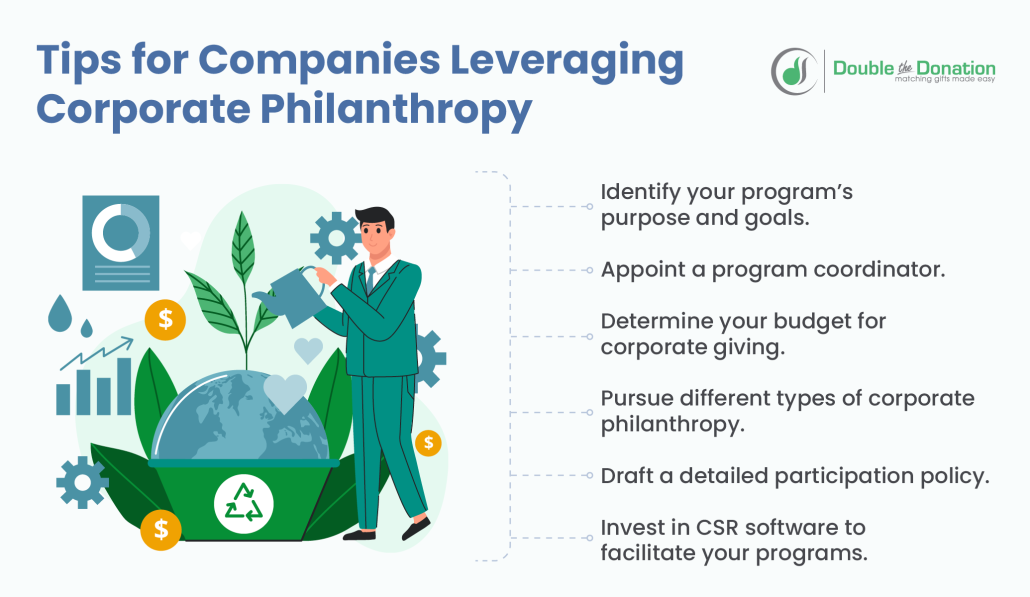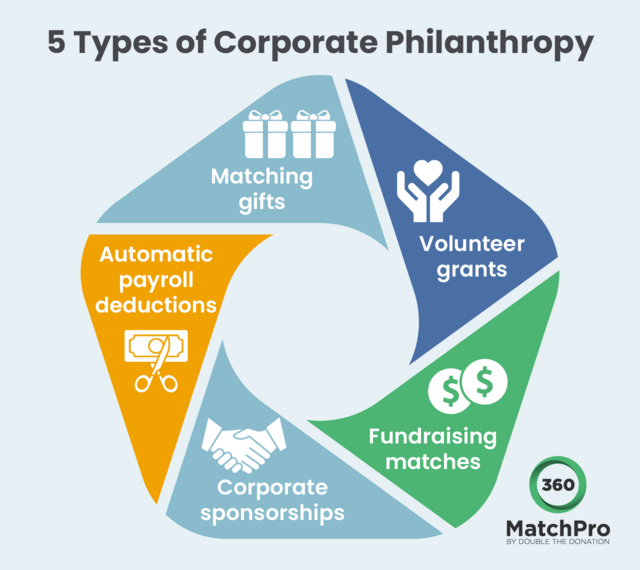How employee engagement enhances corporate philanthropy outcomes
The Duty of Business Philanthropy in Fostering Sustainable Organization Practices
Corporate philanthropy has become an essential approach for businesses aiming to integrate sustainability into their operations. By lining up business purposes with ecological and social campaigns, organizations can foster healthier communities. This technique not just improves business online reputation yet additionally reinforces stakeholder partnerships. Nonetheless, the real level of its effect on lasting organization success stays to be explored. What cutting-edge methods are being embraced because of this?
Understanding Corporate Philanthropy and Its Importance
Company philanthropy functions as a crucial device with which services can contribute to social health while improving their own credibilities. This practice involves companies designating resources, such as funds, time, or competence, to support community campaigns, charitable causes, or social programs. By participating in humanitarian efforts, firms can deal with pressing social problems, such as education, healthcare, and environmental worries, thus playing a pivotal function in promoting favorable adjustment.
Business philanthropy can boost worker spirits and bring in skill, as individuals progressively seek to work for socially liable organizations. It can additionally enhance consumer loyalty, as customers prefer brand names that show a commitment to making a distinction. Inevitably, understanding the value of corporate philanthropy hinges on acknowledging its double advantages: enriching neighborhood well-being while concurrently boosting company trustworthiness and trustworthiness in the eyes of stakeholders. This placement of social duty with commercial rate of interests underscores its relevance in today's business landscape.
The Connection In Between Company Philanthropy and Sustainability
While many business take part in philanthropy to improve their public image, a deeper link exists in between company philanthropy and sustainability. Corporate philanthropy commonly straightens with sustainable techniques by supporting initiatives that attend to social and environmental challenges. They contribute to a healthier community and society when services spend in neighborhood projects, renewable power, or educational programs. This dedication not just fosters goodwill but also enhances stakeholder relationships, improving brand commitment.

Instance Researches: Effective Business Philanthropy Initiatives
Various companies have actually effectively integrated kind initiatives into their service techniques, demonstrating the substantial advantages of such dedications. For example, Microsoft has launched various programs, such as its AI for Earth effort, which supports environmental sustainability with technology. This approach not only help conservation initiatives however likewise boosts Microsoft's track record as a leader in corporate responsibility.
Likewise, Unilever's Sustainable Living Plan highlights environmental and social impact, straightening its philanthropy with business purposes. By funding jobs that enhance hygiene and hygiene, Unilever reinforces its brand name while contributing to global health and wellness.
An additional notable example is Patagonia, which pledges 1% of sales to environmental causes. This commitment reverberates with consumers, promoting loyalty and driving sales.
These situation researches highlight that effective business philanthropy can yield financial returns while promoting lasting practices, strengthening the concept that honest business methods are advantageous for both culture and profits.
Building Stronger Stakeholder Relationships Via Philanthropy
Philanthropy functions as a crucial tool for firms seeking to strengthen their partnerships with stakeholders, as it promotes count on and shows a commitment to social duty. By involving in philanthropic campaigns, home organizations can get in touch with regional areas, enhancing their online reputation and motivating stakeholder loyalty. This interaction usually causes purposeful interactions, creating a sense of shared worths in between the company and its stakeholders.
Moreover, humanitarian efforts can resolve specific area requirements, allowing organizations to add favorably to social difficulties. This participation not just showcases a firm's ethical position but additionally helps in bring in and keeping customers that focus on social responsibility.
Furthermore, staff members commonly feel more motivated and engaged when they see their organization actively taking part in humanitarian activities, bring about an extra efficient workplace culture. Subsequently, corporate philanthropy ends up being a strategic opportunity for constructing more powerful, much more durable connections with diverse stakeholder groups.
Determining the Impact of Corporate Philanthropy on Business Success
The link between corporate philanthropy and stakeholder involvement sets the phase for examining its effect on total company success. Organizations typically determine this influence through numerous metrics, including brand name reputation, employee fulfillment, and consumer commitment. Philanthropic campaigns can enhance a company's image, promoting depend on amongst capitalists and customers alike. Engaged employees tend to exhibit greater spirits and efficiency, directly correlating to improved business efficiency.
Measurable evaluation can likewise be utilized, with organizations evaluating economic returns versus humanitarian expenditures. Research shows that firms Clicking Here with solid philanthropic commitments often experience greater supply performance and reduced volatility. In addition, qualitative evaluations, such as stakeholder comments, can provide understandings right into community assumptions and long-lasting relational benefits.
Inevitably, determining the impact of company philanthropy needs a diverse approach, incorporating both qualitative and measurable information to guarantee a thorough understanding of its impact on company success. corporate philanthropy.
Regularly Asked Concerns
How Can Tiny Companies Involve in Business Philanthropy Effectively?
.png)
What Prevail False Impressions Regarding Corporate Philanthropy?

Exactly How Does Corporate Philanthropy Impact Worker Spirits?
Business philanthropy positively affects employee spirits by promoting a sense of function, enhancing work satisfaction, and promoting commitment. Workers often really feel much more involved and inspired when their firm adds to social causes, producing a supportive workplace.
What Are the Tax Obligation Benefits of Company Philanthropy for Services?
Corporate philanthropy uses significant tax advantages for companies, consisting of deductions on philanthropic payments and prospective decreases in taxable earnings. These motivations encourage firms to participate in social efforts while all at once enhancing their economic standing.
How Can Business Pick Reliable Philanthropic Partners?
Business can pick effective humanitarian More Info companions by evaluating positioning with their worths, determining impact capacity, checking out financial transparency, and promoting solid interaction. This tactical technique boosts cooperation and guarantees shared benefits for both events entailed.
Corporate philanthropy serves as a vital system via which services can contribute to social well-being while improving their own track records - corporate philanthropy. Inevitably, understanding the importance of corporate philanthropy lies in recognizing its double benefits: enriching neighborhood welfare while at the same time improving service integrity and reliability in the eyes of stakeholders. While several firms involve in philanthropy to boost their public picture, a deeper connection exists between corporate philanthropy and sustainability. The link in between business philanthropy and stakeholder interaction sets the stage for evaluating its influence on total service success. Business philanthropy provides significant tax advantages for services, including deductions on philanthropic payments and prospective reductions in taxed revenue